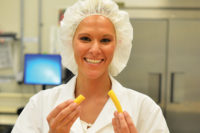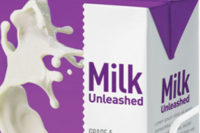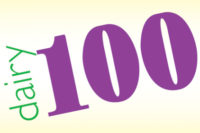The cows are so relaxed while they are milked that they fall asleep. A spray of water wakes them just as the carousel completes its revolution to return the cows to the barn.
Farming is an expensive business that requires large investments in cows and machinery. Martin talked excitedly about advances in breeding technology, punctuating his points with an ever-present unlit cigar. Matching the right bull (actually, bull semen) to the right cow can yield a more productive animal, he said. He is on a quest for that animal.
Balancing environmental concerns
Outside one barn, Martin has a composter that converts manure into clean, soft bedding for the cattle stalls. The re-purposing of a waste product into a usable product is one example of a co-op member’s approach to environmental issues.
Tillamook has participated in regional commissions to find solutions to protect water quality and habitat in the Tillamook Bay watershed, where salmon fishermen and oystermen are also active.
The commissions seek to balance the competing interests of farmers, fishermen and others. For its efforts, the co-op received the Oregon State Land Board Stream Project Award for “exemplary efforts to promote responsible stewardship of Oregon’s natural resources” by removing a dam.
The co-op has installed more than 200 miles of streamside fencing, replaced and removed culverts, built cattle bridges, paved cattle paths and installed remote cattle watering sites. It funded projects totaling more than $500,000 that protect water quality and help improve salmon habitat.
Success in any business (not just farming or dairy processing) is about being balanced. It’s having a diversity of customers instead of relying on just a few large ones. It’s buying quality ingredients but not paying too much for them. And it’s balancing production with inventory.













